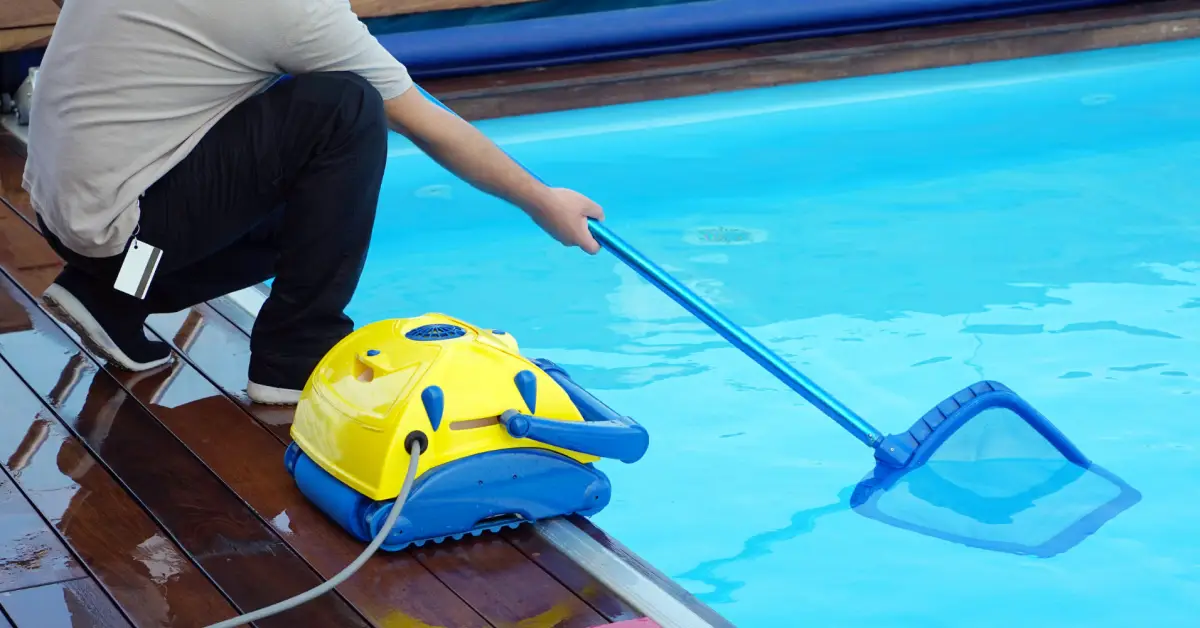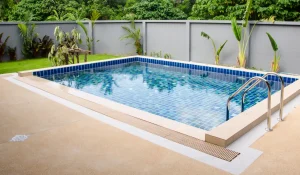Pool Leak Detection & Repair – Preventing Sinkholes
As a pool owner, the importance of pool leak detection cannot be overstated. Unaddressed pool leaks can lead to costly consequences, including the formation of sinkholes that pose risks to your property and safety. In this blog post, you’ll learn about pool leaks and sinkholes, and how a can pool leak cause sinkhole. We will also discuss how to identify and prevent them, and the costs associated with pool leak detection and sinkhole repair. Armed with this knowledge, you’ll be better equipped to protect your investment and ensure a safe and enjoyable swimming experience.
- Understanding and managing pool leaks promptly is essential to avoid the formation of sinkholes.
- Professional expertise is necessary for successful detection and repair of pool leaks, protecting property from Damage.
- Early detection and regular maintenance can help minimize costs associated with repairs.
Understanding Pool Leaks and Sinkholes
Pool leaks refer to water leaks in a swimming pool or spa, which can result in damage to pool equipment, increased water bills, and potentially the formation of sinkholes. Sinkholes are depressions in the ground caused by water erosion or dissolving of underlying rock. Our extensive experience in the industry makes us adept at managing pool leaks to avoid potential damage to pool equipment, increased water bills, and sinkhole formation.
Understanding the link between pool leaks and sinkholes contributes to the safety and functionality of your swimming pool. Leaking water from pool leaks can have a detrimental effect on the soil, potentially leading to the formation of sinkholes. To prevent sinkhole formation and protect your property, it’s important to address pool leaks promptly and ensure proper pool maintenance.
What is a Pool Leak?
A pool leak is a crack or hole in the pool structure, plumbing, or equipment that enables water to escape from the pool. Cracks in the pool structure, damaged plumbing, and malfunctioning equipment are the most common causes of pool leaks. Spa leak detection is also important to prevent similar issues in spas.
In addition to the pool structure itself, leaks can occur in other components such as pool skimmers and the concrete pool deck, which are frequently linked to pool leaks. Engaging professional help for pool leak detection and repair is advisable to promptly identify and tackle all potential issues.
What is a Sinkhole?
Sinkholes are natural depressions or holes in the ground caused by the collapse of a surface layer, often due to water erosion or dissolving of underlying rock. The formation of sinkholes is generally attributed to a combination of factors, including water level decline, soil disturbance, and the dissolution of surface rock.
Additionally, activities such as drought, groundwater pumping, and drilling may also have an effect. Even small leaks in pools can exacerbate these conditions, underlining the need for prompt attention to pool leaks to prevent sinkholes.
The Connection Between Pool Leaks and Sinkholes
Unaddressed pool leaks can lead to soil erosion and eventually sinkhole formation, posing risks to property and safety. By detecting and repairing pool leaks in a timely manner, you can minimize the risk of sinkholes and protect your property.
Consistent pool maintenance and expert help are key to identifying and managing pool leaks, thus helping to ward off potential sinkholes.
Signs and Symptoms of Pool Leaks
Early detection of pool leaks is key to minimizing damage and averting sinkhole development. Some common indicators of pool leaks include decreasing water levels, moist areas around the pool, and discernible cracks in the pool structure.
If you are consistently adding more than two inches of water to your pool on a weekly basis, it is likely that a leak exists and requires repair. In addition, moisture on the ground at the equipment pad or water spraying when the pump is turned off can also indicate a leak.
Water Level Dropping
Keeping an eye on pool water levels can help identify potential leaks promptly. Performing a “bucket test” can help determine if a leak is present in the pool. By comparing the water level in a bucket placed on the pool steps to the water level in the pool itself, you can determine if the pool is losing water due to evaporation or a leak.
Another useful tool for American leak detection is pool leak detection dye, which can help identify areas with unbalanced water flow, pinpoint potential cracks, and fix leaks. Leak detection services often utilize this dye to ensure accurate results.
Wet Spots Around the Pool
Wet spots or soggy areas around the pool may indicate a leak, which could potentially result in soil erosion and sinkhole formation. These wet spots may be attributed to pool leaks, plumbing leaks, or erosion resulting from water movement underground.
Examining the surrounding area, particularly the nearby soil for dampness and erosion, aids in detecting pool leaks and averting sinkholes.
Cracks in Pool Structure
Cracks in the pool structure can result in leaks and can exacerbate if not attended to promptly. Leaks from cracks in the pool structure can result in water seeping into the ground, potentially leading to sinkhole development.
Prompt repair of these cracks, addressing pool leaks, and conducting plumbing repairs are vital steps to limit damage and avert sinkhole formation.
Preventing Sinkholes Caused by Pool Leaks
Swift identification and repair of pool leaks are vital to prevent sinkholes. Implementing regular pool maintenance, early leak detection, and seeking professional assistance are recommended for preventing sinkholes caused by pool leaks. By addressing pool leaks promptly and ensuring proper pool maintenance, you can minimize the risk of sinkhole formation and protect your property.
Consistent pool maintenance is a key strategy to ward off pool leaks and potential sinkholes. Here are some essential practices for maintaining a leak-free pool:
- Skimming, brushing, and vacuuming the pool weekly
- Checking the water quality regularly
- Cleaning the filter and various baskets
- Maintaining the water level
- Scrubbing the tiles and walls
- Adjusting the chemical levels
- Backwashing or cleaning the filter
- Running the pool pump for 8-12 hours per day
By following these practices, you can ensure that your ground pools remain in good condition and free from leaks, including maintaining the integrity of the pool wall.
Regular Pool Maintenance
The importance of routine pool maintenance cannot be overstated. Ensuring proper upkeep of the pool includes:
- Balancing chemicals
- Emptying baskets
- Vacuuming
- Brushing
These tasks help to prevent leaks and potential sinkhole formation.
Furthermore, investing in a pool monitoring system that provides real-time leak alerts and remote monitoring, as well as utilizing a pool cover when the pool is not in use to reduce evaporation and water loss, can contribute to effective pool maintenance and leak prevention.
Early Leak Detection
Early detection of pool leaks is critical to minimize damage and avert sinkhole formation. Here are some steps you can take to detect pool leaks early:
- Perform regular inspections of the pool area for signs of sinkholes.
- Ensure adequate drainage around the pool area.
- Utilize leak detection tools such as the bucket test or dye test to identify leaks early.
By following these steps, you can catch pool leaks early and prevent further damage.
By detecting and repairing pool leaks in a timely manner, you can minimize the risk of sinkholes and protect your property.
Professional Assistance
Seeking professional help for pool leak detection and repair offers numerous advantages, such as:
- Ensuring that the job is completed correctly and any potential sinkholes are avoided
- Inspecting the pool thoroughly and identifying any potential problems
- Addressing any identified issues promptly
Partnering with reputable professionals, such as Silverline Pools, guarantees 100% customer satisfaction and a comprehensive approach to pool leak detection and sinkhole remediation. For more information, call us.
Repairing Pool Leaks and Sinkholes
Professional assistance is paramount for effective repair of pool leaks and sinkhole remediation to prevent further damage. The process of repairing pool leaks typically involves patching, sealing, and replacing damaged components. Sinkhole remediation, on the other hand, may involve filling the sinkhole, stabilizing the surrounding soil, and repairing any damage to the pool or property.
The complex process of detecting and repairing pool leaks and sinkholes necessitates specialized knowledge, tools, and techniques. By enlisting the services of experienced professionals, you can ensure that your pool leak and sinkhole issues are effectively addressed, protecting your property and ensuring the safety of your swimming pool.
Fixing Pool Leaks
To address pool leaks, professionals may:
- Replace faulty glue joints or cracked fittings
- Employ pool putty or waterproof silicone for minor repairs
- Substitute seals or top up the water level
- Utilize Fix-A-Leak solution
- Apply epoxy putty to fill cracks
- Secure fittings with silicone
For vinyl liner pools, repairing a leak can involve cutting out a patch larger than the tear and sealing it with glue.
In some cases, pool leaks may be located in the underground plumbing pipes. A pool plumbing pressure test can be conducted to determine if any pipes are leaking. By working with experienced professionals, you can ensure that all potential leaks are accurately detected and repaired, minimizing damage and preventing sinkhole formation.
Sinkhole Remediation
Sinkhole remediation involves filling the sinkhole with a mixture of soil and cement, and then compacting the soil to ensure that the sinkhole is filled and stabilized securely. This process can be complex and requires specialized knowledge and equipment.
By enlisting the services of experienced professionals with years of experience and industry expertise, you can ensure that your sinkhole issues are effectively addressed, protecting your property and ensuring the safety of your swimming pool.
The Cost of Pool Leak Detection and Sinkhole Repair
The cost of pool leak detection and sinkhole repair can vary depending on several factors, such as the size of the pool, the location of the leak, and the remediation methods needed. On average, pool leak detection costs approximately $300.
However, there are ways to minimize the costs associated with pool leak detection and sinkhole repair, such as early detection, regular maintenance, and working with reputable professionals.
Factors Affecting Costs
A multitude of factors, including the pool type, leak location, and necessary remediation methods, can impact the cost of pool leak detection and sinkhole repair. Pressure testing pool lines, for example, can range from $200 to $500, while repairing a pool liner can cost between $100 and $3,600. Repairing a pool skimmer may cost between $100 and $250, and repairing a pool light can range from $65 to $150 per light.
Labor costs also play a significant role in the overall cost of pool leak detection and sinkhole repair. Enlisting a specialist to re-establish balance in a pool after a major leak is estimated to cost between $50 and $100 per hour.
Although these costs might appear substantial, investing in professional assistance for pool leak detection and sinkhole repair is crucial to ensure effective management and prevention of further damage.
Saving Money on Repairs
To minimize the costs of pool leak detection and sinkhole repair, consider implementing early detection and regular maintenance practices. Performing DIY leak detection methods, such as the bucket test or dye test, prior to enlisting professional help can save money. Additionally, some companies offer free estimates for pool leak detection services, which can help you make an informed decision.
Additionally, investing in a pool monitoring system that provides real-time leak alerts and remote monitoring can help identify leaks early and prevent costly repairs. Working with reputable professionals, like Silverline Pools, ensures high-quality service and accurate leak detection, ultimately saving money on repair costs.
Summary
In conclusion, pool leak detection and sinkhole prevention are crucial aspects of pool ownership. Understanding the connection between pool leaks and sinkholes, recognizing the signs and symptoms of pool leaks, and implementing preventive measures can minimize the risk of property damage and ensure a safe swimming environment. By enlisting the services of experienced professionals such as Silverline Pools, you can protect your investment and enjoy peace of mind knowing your pool is well-maintained and free of leaks and sinkholes.
Frequently Asked Questions
Can a leak in a inground pool cause a sinkhole?
Leaking water from an inground pool is one of the main causes of a sinkhole. If a pool is allowed to leak, it can lead to the formation of a very large and dangerous sinkhole over time.
What happens when an inground pool leaks?
If an inground pool leaks, it puts unnecessary strain on the equipment and can damage the shell, making it difficult to keep the pH balanced.
How do I find the source of my pool leak?
Check the pool plumbing and equipment for loose connections or worn O-rings, then use a dye test to locate any tears in the liner or visible cracks in the pool. Wait 24–48 hours for a still, clear day and use a leak detector dye to observe closely and pinpoint the exact source of your leak.
What is the average cost of pool leak detection?
Pool leak detection typically costs around $300, making it a relatively inexpensive service.
What measures can be taken to prevent sinkholes caused by pool leaks?
To prevent sinkholes caused by pool leaks, it is essential to detect and fix leaks promptly, maintain the pool regularly, and seek professional help.



